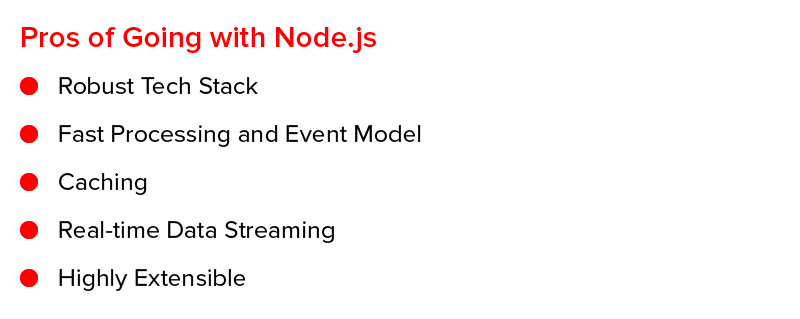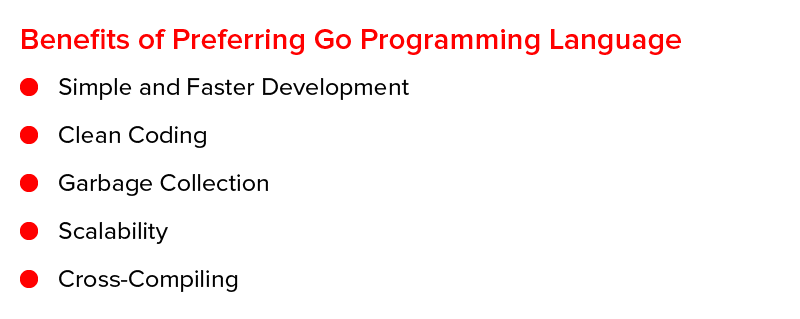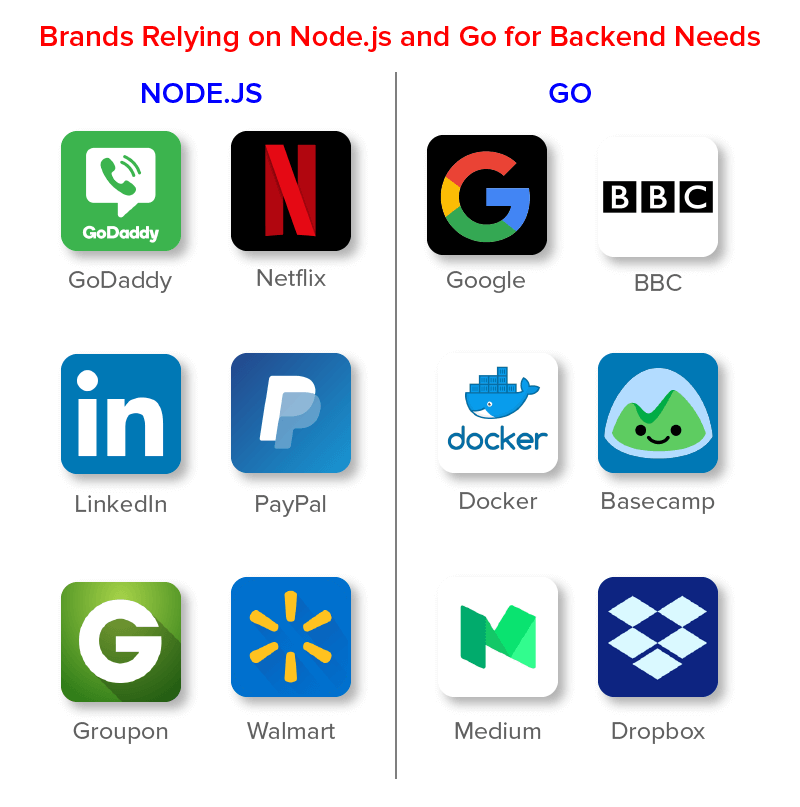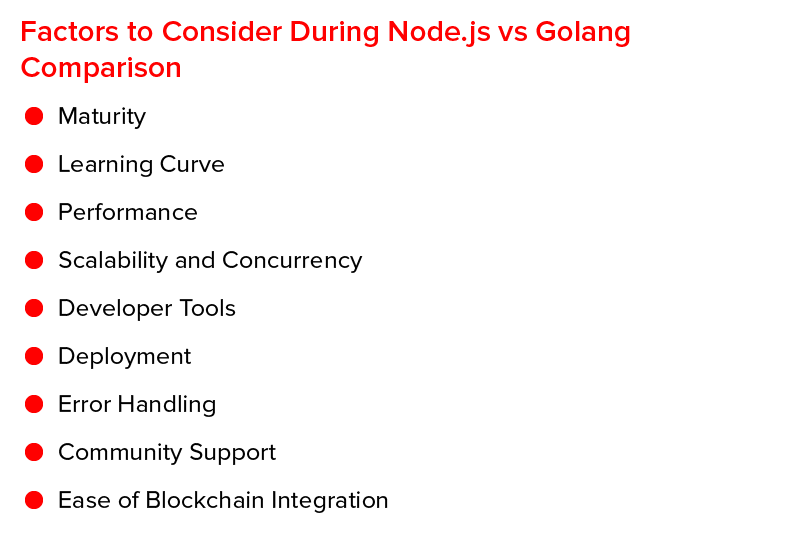What makes a mobile application successful? Regardless of how much you appreciate the design and idea, the truth is that the prime pillar of app success is its Backend. The better the application serves the business logic and perform all the tasks effectively and smoothly, the better outcomes it delivers.
Now, while this clears that paying attention to the app backend is imperative, the question that arises here is which tech stack to consider for backend development – especially when you have a myriad of options including PHP, ASP.NET, Node.js, and Golang.
As we have already compared the former two, i.e., PHP vs ASP.NET last year, let’s pay closer attention to the latter two, i.e, Node.js vs Golang in this article.
But, before we jump into the crux of this article, i.e, comparison of Node.js vs Golang, let’s refresh our basics first.
[Read Here: A Quick Guide on Mobile App Backend Development]

Though the introductory image throws some light on both the backend development tools, for better clarity, let’s look into what Node.js and Golang actually are and what benefits they offer.
Node.js – What Makes the Server-Side Environment Popular
While many developers and businesses call Node.js as a programming language or a framework, it is actually a cross-platform environment that runs on Google Chrome’s JavaScript engine, V8. It was founded back in 2009 by Ryan Dahl and is known for serving developers with a complete library of different JS modules that simplifies the web and mobile app development process.
The framework, as per Node-by-Numbers report of 2018, has 368,985,988 downloads and over 578 new contributors in 2018 itself – which makes it nearly impossible for the developers to overlook it. But, the prime reason why developers feel magnetized to the idea of investing in Node.js development is the set of benefits it offers – a few of which are:-

1. Robust Tech Stack
As covered in our Node.js vs PHP article, Node.js is a standalone name in the server-side development industry that works both at frontend and backend. Because of this, it enhances the developer experience – making it easier for them to enjoy higher efficiency, reliability, and opportunity of code reusability.
2. Faster Processing and Event Model
V8, the virtual machines that Node.js framework uses for executing JavaScript, has JIT (Just in Time) compilation mechanism. This makes it easier for the framework to compile source code to machine code at runtime, eventually resulting in higher execution speed.
Besides, while the framework offers the opportunity to design event-based, real-time applications because of synchronization gained by using the same language both at the client and server-side, it is also highly considered for platforms associated with online gaming, video conferences, chats, etc. due to its asynchronous, single-threaded, non-blocking nature.
3. Caching
Another pro of Node.js is that it avails the facility of caching single modules. It ensures that whenever there’s any request for the first module, it gets cached in real-time in the app memory; implying backend developers need not re-execute the code. The caching mechanism will empower the app to load pages and respond to requests swiftly and effectively.
4. Real-time Data Streaming
Node.js offers the option of non-blocking I/O systems that make it easier for all the web and mobile software development company to process numerous request simultaneously and thus, deliver better outcomes in real-time.
5. Highly Extensible
Another advantage of preferring Node.js is that it is highly extensible. This implies one can easily customize and extend Node.js as per their project needs. On one side, they can employ JSON for data exchange between client and web server, while on the other side, they can build HTTP, DNS, TCP, etc. servers using the built-in APIs available with Node.js environment.
With this, we have gained detailed information about Node.js. So, without ado, let’s turn towards the other technology participating in the battle, i.e, Go.
Golang – What’s So Special About This Backend Technology
Golang, also called Go and Google Go, is an open-source, cross-platform, and statically typed programming language. Introduced in 2009, it resembles C++ and Java in terms of code and is one of the Top 20 Programming languages as per Tiobe Index for May 2019 because of the following advantages of Golang language:-

1. Simple and Faster Development
The foremost benefit of considering Go for server-side requirements is that it offers ease and speed in the development process. The Go programming language has a simple syntax based upon functions – with no room for classes and type inheritance. This makes it easier for the developers to compile and launch their app solution in the market at the earliest, get access to feedback for better outcomes, and get an answer to the question, ‘Is Go faster than Node?’
2. Clean Coding
Go is a statically typed, compiled language with a strict typization. This makes it necessary for a web and mobile app software development company to pay more attention to their codes and ensure that the written codes are accurate and useful. This, on a long run, facilitates them with an opportunity to understand and change their code at a better pace, leading to clean coding.
3. Garbage Collection
Go language also comes with the facility of Garbage collection (also called Automatic memory management). The programming language has lower down its latency to less than 1ms by operating concurrently with various programs and employing a tricolor mark-and-sweep algorithm.
4. Scalability
Designed by Google, this programming language is highly scalable in nature. It facilitates developers with the potential to manage multiple sub-tasks simultaneously, especially goroutines and channels.
5. Cross-Compiling
Another feature that makes Go a great choice for server-side development is its property of cross-compilation. The Go compiler enables developers to generate binaries that can be executed on different operating systems using a few simple commands. In simpler terms, it empowers them to cross-compile the source code and run on multiple machines without installing Go on foreign machines and thus, makes the deployment process as smooth as a breeze.
So, as you have seen so far, both the server-side programming languages/frameworks come with a heap of opportunities and facilities. An impact of which is that both the technologies are highly preferred in the market by both startups and well-established brands – a glimpse of which can be taken from the image shared below:-

However, this is not enough to determine what is best for your project. Right?
Considering the same thought, let’s uncover which server-side environment is optimal for your app development needs – Golang versus Node.js – based upon different parameters.
Factors to Consider While Node.js vs Golang Comparison

1. Maturity
Though both Node.js and Go entered the market in the same year, the latter is more decent and mature. And the reason behind this is that the former, i.e, Node.js operates with several APIs that undergo continual changes.
2. Learning Curve
Another factor that contributes to the process of determining which is the right backend tool is Learning curve.
On one side, Node.js, being one of the top JavaScript frameworks for 2019, relies on JavaScript. This makes it easier for one to learn and begin developing a solution in Node.js environment.
Whereas, on the other side, Golang is a complete language in itself – making it necessary for a web and mobile application development team to be familiar with basic rules, processes, pointers, and programming concepts before starting with it.
This signifies that Node.js is simpler to learn and thus, is preferred over the other option in the Node.js vs Golang battle.
3. Performance
When considering go vs node performance, Go wins the credit of being the best backend development tool among the two because of its lower app loading and response time. This is because JavaScript, the language on which Node.js platform rely upon, takes more time for executing code than what is required in the case of Go. Besides, Go has also proved itself as a leader in terms of memory-bound tasks and raw CPU performance.
4. Scalability and Concurrency
Node.js is a single-threaded platform where the instructions are executed in a particular sequence. While this seems like a good practice, it creates more challenges for developers when considering large apps with massive scaling and needs for the execution of different processes in parallel.
However, when considering Go, the language offers better concurrency options than JavaScript and enable developers to work with multiple threads at the same time without using much of RAM.
This implies Go offers better results when comparing concurrency in Node and go.
5. Developer Tools
Node.js comes up with a heap of ready-made solutions that simplifies the development process and cut the cost and time required. For example, NPM in Node.js environment consists of 800,000 built-in building blocks which developers can install and run efficiently and effortlessly as per their requirement.
Go, on the other side, has a standard comprehensive library with features that act independently of any third-party. Because of this, Go has less number of tools than Node.js – making the latter the answer of what is better – Node.js or Golang.
6. Deployment
When you consider using Go and Node.js for software development in terms of deployment, the former proves to be a better option. This is because Node.js demands installation of NPM (Node Package Manager) on the server, or the need to pull down app project code with pm2 on the server for running it effectively. But, when it comes to Go-based backend app development, there is no need for any locale. The binary generated from the build is automatically dropped to the server. This makes the developers find it worth switching to Go from Node.js.
7. Error Handling
When talking about who will win in the Golang versus Node.js battle in terms of Error Handling, both the platforms deliver optimal solutions. While the Node.js goes with the convention ‘try…catch’ error technique, in which errors are caught just the moment they occur, Go requires explicit error handling when the program code is flowing in a uniform manner.
8. Community Support
Another reason why developers prefer Node.js over Golang is that the former has a wide and vibrant open-source community, with thousands of contributors and support from various popular brands such as IBM, PayPal, GoDaddy, Intel, and Microsoft. But, when it comes to Golang, the language has comparatively smaller community.
9. Ease of Blockchain Integration
Since the idea of Blockchain app development is attracting almost everyone in the industry, it can be a profitable decision to consider blockchain integration as a factor when considering Node.js vs Golang.
So, when talking about introducing Blockchain in an app project using Node.js, it seems easier to implement. However, the converse is true. That implies it is much easier to integrate Blockchain in an app solution with Go, provided it entails the application of an array and a map such that array holds the ordered hashes and maps contain the unordered hashes.
So, as you can depict from what we have covered so far, there is no perfect language/tech stack that fits every project requirement. While Go is the optimal server-side environment for microservices and enterprise projects where you need to deal with high loads, Node.js is an ideal choice to mitigate development challenges using the ready-made solutions and design a custom app in lower time.
The choice completely depends on what your app project requirements are, who your target audience is, and more. So, the right way to find the best server-side environment for your application development needs – Node.js vs Golang – is to consult with the best mobile app software development company.


strategies your digital product..




